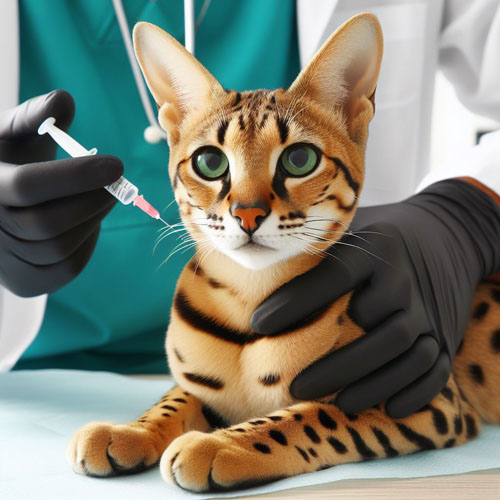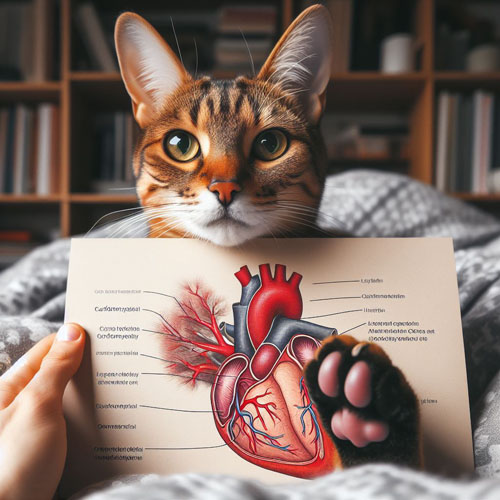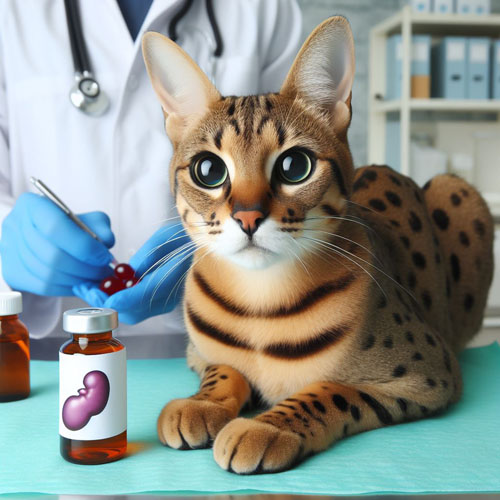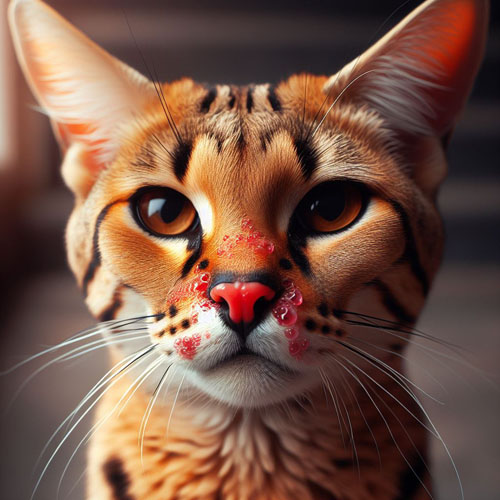Guide to Cancer in Savannah Cats
Comprehensive Guide to Cancer in Savannah Cats: Recognizing Warning Signs, Treatment Options, and Promoting Feline Well-Being
Savannah cats, known for their striking appearance and unique hybrid lineage, are cherished companions. However, like all feline friends, they can be susceptible to health issues, including cancer. In this detailed exploration, I will delve into the various types of cancer that may impact Savannah cats, the warning signs that pet owners should be vigilant about, and the diverse treatment options available to address feline cancer. By understanding these aspects, cat owners can proactively manage their Savannah cats’ health and well-being, ensuring a higher quality of life for their feline friends.
Understanding Types of Cancer in Savannah Cats: Savannah cats can experience a range of malignancies, each with its distinct characteristics and implications for their health. Among the common types of cancer observed in Savannah cats are:
- Lymphoma: This cancer affects the lymphatic system, which plays a crucial role in the body’s immune response. Lymphoma in Savannah cats can manifest in various forms, impacting organs such as the liver, spleen, or intestines.
- Squamous Cell Carcinoma: Known for its association with sun exposure, squamous cell carcinoma is a type of skin cancer that may affect Savannah cats. It often presents as lesions on the ears, nose, or other areas with less hair coverage.
- Mast Cell Tumors: These tumors originate from mast cells, which are part of the immune system. Mast cell tumors can be found in the skin or internal organs, and their behavior can range from benign to malignant.
- Mammary Gland Tumors: Mammary gland tumors are more common in female cats, and early spaying can significantly reduce the risk. These tumors can be benign or malignant, underscoring the importance of regular veterinary check-ups.
- Fibrosarcoma: Fibrosarcoma is a type of soft tissue sarcoma that may affect Savannah cats. It can occur at the site of previous vaccinations, emphasizing the need for vigilance in monitoring potential vaccine-related complications.
- Osteosarcoma: This aggressive bone cancer can impact the limbs of Savannah cats. While relatively rare, osteosarcoma can be challenging to treat, often requiring a combination of surgery and other therapeutic modalities.
Understanding the spectrum of cancers that can affect Savannah cats is essential for early detection and intervention. Regular veterinary check-ups, coupled with awareness of changes in a cats mannerisms, empower cat owners to actively participate in their pets’ well-being and promptly address any emerging health concerns. By recognizing the signs and symptoms associated with these common cancers, owners can contribute to the early diagnosis and effective management of cancer in their beloved Savannah cats.
Recognizing the Warning Signs of Cancer in Savannah Cats: Being attuned to the subtle changes in behavior and physical appearance of Savannah cats is crucial for early detection and intervention in case of potential cancer. While the signs may vary based on the type and location of the cancer, there are common indicators that cat owners should be vigilant about. These warning signs include:
- Unexplained Weight Loss: A sudden and unexplained drop in body weight is a significant red flag. Weight loss can be indicative of various health issues, including cancer. Regular monitoring of your Savannah cat’s weight is essential for identifying any concerning changes.
- Changes in Appetite: Pay attention to alterations in your cat’s eating habits. An increase or decrease in appetite that persists over time may suggest an underlying health issue, and it is crucial to consult with a veterinarian if you notice any significant changes.
- Lumps or Bumps: Palpable lumps or bumps on your cat’s body, especially in areas such as the mammary glands, should be investigated promptly. While not all masses are cancerous, timely evaluation is essential for an accurate diagnosis and appropriate treatment.
- Altered Behavior: Cancer can influence a cat’s behavior, leading to noticeable changes. Watch for signs of lethargy, increased irritability, or withdrawal from activities that your cat typically enjoys. Behavioral alterations may be indicative of an underlying health concern, including cancer.
- Difficulty Breathing or Swallowing: Respiratory or swallowing difficulties may signal cancer affecting the respiratory or digestive systems. If you observe any labored breathing, persistent coughing, or difficulty swallowing, it is crucial to seek immediate veterinary attention.
- Changes in Bathroom Habits: Any noticeable changes in urination or defecation patterns should be carefully monitored. Diarrhea, constipation, or blood in the urine or feces may indicate an underlying issue, and these symptoms should be promptly addressed by a veterinarian.
- Lethargy or Weakness: Persistent lethargy or weakness that goes beyond the usual resting periods may suggest an underlying health problem. Cats are generally known for their playful and energetic nature, so any significant deviation from their usual activity level should be investigated.
- Visible Changes in the Eyes or Ears: Unexplained discharge, changes in the color of the eyes, or the appearance of masses around the ears could be indicative of health issues, including cancers affecting these areas.
- Changes in Coat or Skin: Pay attention to alterations in the coat’s texture, such as persistent matting or changes in color. Skin abnormalities, including sores that don’t heal or changes in pigmentation, may also warrant veterinary attention.
Being proactive in monitoring your Savannah cat for these warning signs and promptly seeking professional veterinary advice can significantly contribute to early detection and improved outcomes in the event of cancer. Regular veterinary check-ups, coupled with a keen understanding of your cat’s baseline behaviors and physical appearance, empower cat owners to play an active role in their pets’ health and well-being.
Treatment Options for Cancer in Savannah Cats: The approach to treating cancer in Savannah cats varies based on factors such as the type of cancer, its stage, and the overall health of the cat. Tailored treatment plans may involve a combination of the following options:
- Surgery: Surgical removal of tumors is a common approach if the cancer is localized and hasn’t spread. This can be curative or a vital part of a multimodal treatment plan. The type of surgery and postoperative care are critical considerations for successful outcomes.
- Chemotherapy: Administering chemotherapy drugs helps target and kill cancer cells. It is often used in conjunction with surgery to improve treatment outcomes. Chemotherapy protocols are designed to minimize side effects and enhance the cat’s overall well-being during treatment.
- Radiation Therapy: Using targeted radiation helps shrink tumors and slow the progression of the disease, particularly when surgery isn’t feasible. Advanced technologies, such as intensity-modulated radiation therapy (IMRT), provide precise treatment while minimizing damage to surrounding healthy tissues.
- Immunotherapy: Immunotherapy stimulates the cat’s immune system to recognize and attack cancer cells. It is an evolving field with promising results. Various immunotherapeutic approaches, including monoclonal antibodies and cancer vaccines, are being explored for feline cancer treatment.
- Palliative Care: In cases where a cure is not possible, palliative care focuses on providing comfort and improving the cat’s quality of life. This can involve pain management, nutritional support, and measures to address specific symptoms associated with the cancer.
Understanding the Prognosis for a Savannah Cat Diagnosed with Cancer:
When a Savannah cat is diagnosed with cancer, understanding the prognosis is a crucial aspect of navigating the journey ahead. The prognosis, or the likely course and outcome of the disease, depends on several factors, including the type of cancer, its stage at the time of diagnosis, and the effectiveness of the chosen treatment plan.
- Type of Cancer: Different types of cancer have varying prognoses. Some cancers are more aggressive and challenging to treat, while others may respond well to intervention. Lymphoma, for example, can be highly responsive to certain treatments, providing a more favorable prognosis in some cases.
- Stage of Cancer: The stage at which cancer is diagnosed plays a pivotal role in determining the prognosis. In general terms, an early-stage diagnosis implies that the cancer is localized and has not spread to other parts of the body, offering a better chance of successful treatment and a more positive outlook. Conversely, an advanced-stage diagnosis indicates that the cancer has spread, making treatment more challenging and the prognosis potentially less optimistic.
- Treatment Modalities: The chosen treatment plan significantly influences the prognosis. Treatment options, such as surgery, chemotherapy, radiation therapy, immunotherapy, or a combination of these, aim to address the specific characteristics of the cancer. The success of treatment, potential side effects, and the cat’s overall response contribute to shaping the prognosis.
- Response to Treatment: How well a Savannah cat responds to the selected treatment is a key determinant of the prognosis. Some cats may exhibit a positive response, with the cancer showing signs of regression or stabilization. On the other hand, a lack of response or the development of treatment-resistant cancer may impact the overall outlook.
- Overall Health of the Cat: The general health and well-being of the Savannah cat also influence the prognosis. Cats in good overall health may better tolerate treatments, experience fewer complications, and have an improved quality of life during and after therapy.
It’s important for cat owners to engage in open and honest discussions with their veterinarian regarding the prognosis. Veterinarians can provide valuable insights into the potential challenges and successes associated with the chosen treatment plan, helping owners make informed decisions about their cat’s care.
In some cases, the prognosis may be guarded, indicating uncertainties about the outcome. This underscores the need for ongoing communication between the veterinarian and the cat owner, allowing for adjustments to the treatment plan based on the cat’s individual response and any emerging considerations.
It’s crucial to approach the prognosis with realistic expectations, acknowledging that each cat is unique, and responses to cancer and treatment can vary. While a positive prognosis is always hopeful, a less optimistic outlook should not discourage owners from providing their Savannah cat with the best possible care, comfort, and support throughout the treatment process. Regular veterinary check-ups, ongoing monitoring, and adjustments to the treatment plan as needed contribute to the overall well-being of the cat, enhancing the quality of life during and after cancer treatment.
Preventive Measures and the Importance of Regular Veterinary Check-ups in Savannah Cats: While it’s true that not all forms of cancer can be entirely prevented, adopting proactive measures and scheduling regular veterinary check-ups are vital components of responsible cat ownership. These efforts contribute to early detection, better treatment outcomes, and overall enhanced well-being for Savannah cats.
- Spaying and Neutering: In female cats, early spaying significantly reduces the risk of mammary gland tumors, which can be malignant. Spaying also eliminates the possibility of ovarian and uterine cancers. For males, neutering can prevent testicular cancer and reduce the likelihood of certain prostate issues.
- Balanced and Nutritious Diet: Providing a well-balanced and nutritionally complete diet is fundamental to maintaining the overall health of Savannah cats. A nutrient-rich diet supports their immune system and helps prevent obesity, a condition linked to an increased risk of certain cancers.
- Minimizing Environmental Carcinogens: Cats, including Savannah breeds, can be exposed to environmental factors that may contribute to cancer. Limiting exposure to potential carcinogens, such as tobacco smoke, certain household chemicals, and outdoor pollutants, can play a role in reducing cancer risks.
- Regular Physical Exercise: Encouraging regular physical activity helps maintain a healthy weight, improves overall fitness, and may contribute to reducing the risk of obesity-related cancers. Interactive play and environmental enrichment are essential for Savannah cats, known for their active and playful nature.
- Vaccinations and Preventive Care: Following a routine vaccination schedule recommended by the veterinarian helps prevent certain infections that may contribute to the development of cancer. Additionally, preventive care, such as parasite control and dental hygiene, supports the cat’s overall health.
- Participation in Routine Screening Programs: Some cancers may be detectable through routine screenings and tests. Regular veterinary check-ups provide opportunities for screenings, including blood tests, imaging studies, and other diagnostic measures to catch potential issues before they become more advanced.
Regular veterinary check-ups are a cornerstone of preventive care. These appointments offer opportunities for thorough physical examinations, discussions about the cat’s overall health, and screenings for potential health issues, including early signs of cancer. Veterinarians may recommend additional diagnostic tests based on breed-specific risks, age, and individual health considerations.
During check-ups, veterinarians can also provide guidance on lifestyle factors, nutritional choices, and environmental modifications that contribute to the cat’s well-being. Establishing a strong partnership with a trusted veterinarian ensures that the cat receives personalized care and that any emerging health concerns are promptly addressed.
Education on Preventive Measures for Feline Cancer Management: Empowering cat owners with knowledge about preventive measures is a fundamental aspect of effectively managing feline cancer. By fostering an understanding of potential risks and implementing proactive strategies, cat owners can play an active role in promoting their feline companions’ long-term health and well-being.
- Spaying and Neutering Awareness: Educating cat owners about the importance of spaying and neutering is crucial. Highlighting the role of these procedures in reducing the risk of certain reproductive cancers, such as mammary gland tumors and testicular cancer, encourages responsible pet ownership and contributes to overall feline health.
- Balanced Nutrition Education: Providing comprehensive information about the significance of a balanced and nutritious diet is essential. Cat owners should understand the role of proper nutrition in supporting the immune system and reducing the risk of obesity-related cancers. Guidance on selecting high-quality cat food and portion control contributes to a cat’s overall health.
- Environmental Carcinogen Awareness: Raising awareness about potential environmental carcinogens is important. Educating cat owners on common household hazards, such as secondhand smoke, toxic plants, and household chemicals, helps them create a safe living environment for their cats. Minimizing exposure to these substances contributes to cancer prevention.
- Regular Exercise Promotion: Emphasizing the importance of regular exercise for feline health is key. Savannah cats, known for their active nature, benefit from engaging playtime and physical activity. Encouraging interactive play and providing environmental enrichment not only supports a healthy weight but also contributes to overall well-being.
- Understanding Breed-Specific Risks: Providing information about breed-specific predispositions helps cat owners be proactive in monitoring their pets. Awareness of potential risks associated with specific breeds enables early detection and intervention. This knowledge empowers owners to collaborate with veterinarians in developing tailored preventive strategies.
- Vaccination Education: Educating cat owners about the significance of vaccinations is vital for preventing certain infectious diseases that may contribute to cancer development. Following a veterinarian-recommended vaccination schedule ensures that cats are protected against preventable illnesses.
- Routine Screening Importance: Communicating the value of routine screenings and veterinary check-ups is essential. Regular appointments allow for thorough examinations, screenings, and discussions about preventive care measures. Encouraging cat owners to stay proactive in scheduling and attending these appointments promotes early detection of potential health issues.
- Dental Hygiene Awareness: Highlighting the importance of dental care is often overlooked in preventive education. Poor oral health can contribute to systemic health issues, and maintaining good dental hygiene is crucial for overall well-being. Cat owners should be educated on regular dental care practices, including tooth brushing and professional cleanings.
- Understanding Early Warning Signs: Educating cat owners about the early warning signs of cancer is crucial for timely intervention. Providing information on changes in behavior, appetite, weight, and physical appearance empowers owners to seek veterinary attention promptly, potentially leading to early diagnosis and improved treatment outcomes.
By fostering a culture of preventive care through education, cat owners become partners in their cats’ health journey. Informed decisions, coupled with regular veterinary collaboration, contribute to a holistic approach in managing feline cancer. Ultimately, an educated and proactive community of cat owners plays a pivotal role in promoting the well-being of their beloved feline companions.
Conclusion
The specter of cancer poses a complex and formidable challenge for Savannah cat owners. These unique feline companions may find themselves grappling with the intricacies of this formidable health concerns. However, by adopting a comprehensive and proactive approach to their care, owners can significantly contribute to the well-being of their beloved Savannah cats in the face of cancer.
Understanding the nuances of these potential health challenges is the first step towards effective management. From lymphoma and squamous cell carcinoma to mast cell tumors and mammary gland tumors, awareness of the diverse types of cancer prevalent in this breed is paramount for early detection and intervention.
Recognizing the warning signs of cancer is equally crucial. Vigilant cat owners must be attuned to subtle changes in behavior, weight, appetite, and physical appearance. These indicators serve as vital cues that prompt timely veterinary attention, facilitating early diagnosis and improving the prospects for successful treatment.
Navigating the journey of cancer in Savannah cats extends to understanding the prognosis. The type and stage of cancer, the chosen treatment modalities, and the individual response of the cat collectively shape the outlook. Open communication with veterinarians, realistic expectations, and a commitment to the cat’s overall well-being are integral components of comprehending and managing the prognosis effectively.
While not all forms of cancer can be prevented, the emphasis on preventive measures and regular veterinary check-ups forms a critical foundation in the proactive care of Savannah cats. Spaying and neutering, balanced nutrition, minimizing exposure to environmental carcinogens, and encouraging regular exercise are essential components of a preventive care regimen. Furthermore, staying informed about breed-specific predispositions and actively participating in routine screenings contribute to early detection and better outcomes.
Education emerges as a powerful tool in the hands of cat owners, enabling them to make informed decisions and actively participate in their cats’ health journey. Understanding the significance of spaying and neutering, the role of nutrition, and the impact of environmental factors empowers owners to create a nurturing environment that minimizes cancer risks.
In the face of a cancer diagnosis, the concept of a holistic and informed approach becomes paramount. From understanding the prognosis to implementing preventive measures, cat owners become partners in the health and well-being of their Savannah cats. The journey is one of collaboration with veterinarians, regular check-ups, and a commitment to providing the best possible care.
Keywords: Savannah Cat Cancer, Feline Oncology, Warning Signs of Cat Cancer, Cat Cancer Treatment, Veterinary Check-ups for Cats





